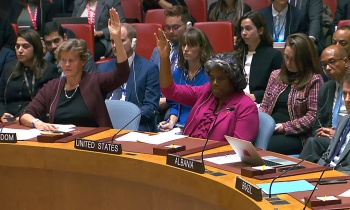The UN Faces a Crisis in Gaza

Over the past month, the United Nations (UN) has worked frantically to grapple with the unfolding crisis in the Middle East.
The Quaker United Nations Office (QUNO) staff in New York have been focused on the UN response to the deteriorating situation in the region and the unfolding emergency in Gaza. In partnership with other civil society organisations, we continue to push for the UN to lead in achieving a peaceful resolution to the conflict.
The UN has been working around the clock to mobilise both a diplomatic response and a massive humanitarian response to the crisis facing Palestinians in Gaza. Most recently, UN Secretary-General Antonio Guterres made a desperate plea for international support, stating that the “way forward is clear. A humanitarian ceasefire. Now. All parties respecting all their obligations under international humanitarian law. Now. This means the unconditional release of the hostages in Gaza. Now. The protection of civilians, hospitals, UN facilities, shelters, and schools. Now. Unfettered access to deliver supplies to all people in need in Gaza. Now. And the end of the use of civilians as human shields. Now. None of these appeals should be conditional on the others.”
A divided UN Security Council (UNSC) has hampered the UN's efforts. There have been four vetoed resolutions within the UNSC restricting the UN's access and ability to respond to the humanitarian crisis. The exercise of the veto by the United States and the United Kingdom on several occasions has meant that calls from across the UN system to provide lifesaving care and supplies have gone unanswered.
Following this failure in the UNSC, the NGO Working Group on Israel-Palestine, of which QUNO is a member, sent letters to Secretary-General Guterres and Brazil, in its capacity as president of the UNSC. The letter urged the UN to take action to bring about a ceasefire, protect humanitarian corridors, and ensure the safety of innocent civilians in Gaza and Israel.
The Working Group also contacted the President of the UN General Assembly (UNGA), urging him to convene an emergency session on the ongoing crisis. On October 26, the UNGA called an emergency special meeting under the "Uniting for Peace" provision that allows the UNGA to come together when the UNSC cannot act. Countries spoke out for justice and humanity, calling for an immediate ceasefire, unrestricted humanitarian access, a return of all hostages, recognition of UN staff that have been killed, and a negotiated peaceful settlement between Israel and Palestine.
On the evening of November 15, the Security Council finally passed Resolution 2712. The resolution focused on the plight of children and called for “urgent and extended” humanitarian pauses and corridors in Gaza, the immediate and unconditional release of hostages held by Hamas and others, as well as humanitarian assistance for civilians. The Security Council also called "on all parties to refrain from depriving the civilian population in the Gaza Strip of basic services and humanitarian assistance indispensable to their survival”.
UN agencies have described the circumstances facing civilians as catastrophic. At the time of writing, over 50% of all housing infrastructure in Gaza had been destroyed, the medical system was on the verge of collapse, and the delay in aid access meant that people would begin to die from dehydration, starvation and disease.
The UN was created for precisely these moments to save lives and provide a global platform to facilitate and work towards peace for all. Given the dire situation on the ground, implementation of the UNSC resolution is essential. Progress will require the cooperation and support of governments that can exert pressure and influence to ensure the resolution is followed. In the current context, the United States and the United Kingdom have a pivotal role.
QUNO will continue to advocate for the UN to fulfil its leadership role for peace and provide humanitarian assistance to all. At the same time, citizens around the world can make a difference by contacting their elected leaders. Citizens can let their leaders know that they support the UN and want full implementation and support for Resolution 2712.
For more information about contacting your member of Congress in the US, please check out these resources from AFSC and FCNL. For readers based in the UK, please visit Quakers in Britain to learn more about contacting your elected Member of Parliament.
Photo Caption: The US and UK abstain from voting for Resolution 2712.
Photo Credit: UN News [@UN_News_Centre | X]


